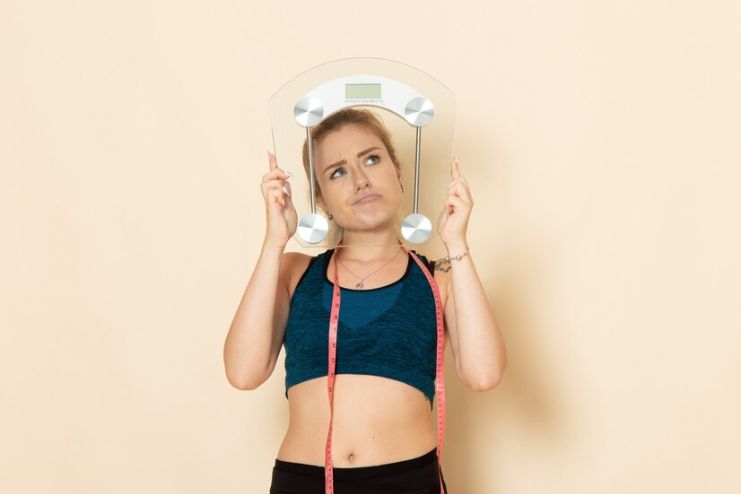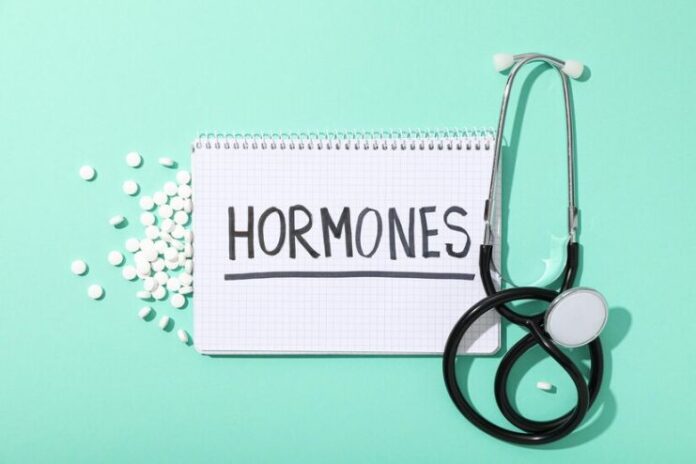AI Contribution
At HealthSpectra, we may use AI to refine grammar and structure, but every piece is shaped, checked, and approved by real people, our expert writers and editors, to ensure clarity, credibility, and care. Learn more..Affiliate Disclaimer
Some links in this article are affiliate links. We may earn a small commission if you make a purchase through these links, at no extra cost to you. We only recommend products we find useful to our readersDo you ever wonder why you feel fatigued even after you have slept the whole night? Or have you experienced a sudden weight increase or become more irritable than usual? The answer might be in your hormones.
Hormones are tiny chemical messengers that control almost all body functions, such as metabolism, mood, and reproduction. However, if the levels of a specific hormone are too low or too high, it leads to hormonal imbalance.
Hormonal imbalances might have deep-rooted causes and are more common than we think. Your hormones can go haywire due to dietary changes, environmental toxins, or puberty. If you have been facing these issues, you might want to have your hormones levels tested.
This article reviews the causes and symptoms of hormonal imbalance and how to treat them. Whether you have PCOS or thyroid issues or are simply striving for a healthier body, this article will help you learn more about hormones and hormonal imbalance.
What Causes Hormonal Imbalance?

Several factors contribute to hormonal imbalance, including chronic stress, poor diet, and inadequate sleep. Here’s how each of these affects your hormones and what you can do about it:
Chronic Stress:
When you are under stress, your body releases cortisol. Cortisol is a stress hormone designed to help the body when in immediate danger. However, chronic stress produces excessive cortisol, which interferes with the functions of other essential hormones, including insulin, estrogen, and thyroid.
Over time, this can lead to symptoms like fatigue, weight gain, and mood swings. High cortisol is usually linked to stress, leading to physical and mental imbalances.
Solution: Adopt a stress-free lifestyle, and include practices such as meditation, yoga, as well as breathing exercises. This can help you keep control of your cortisol levels.
Poor Diet:
Diet has a major role in regulating hormones. You can spike your insulin levels if you indulge in excessive refined sugars, unhealthy fats, or processed foods. Insulin is a hormone that helps the body absorb glucose and keeps blood sugar levels balanced. Higher insulin levels lead to hormonal imbalances in the body.
Solution: Reducing processed foods and including whole foods, including fruits, vegetables, and lean proteins, are a perfect choice to maintain insulin levels and hormonal balance.
Improper Sleep:
Hormonal imbalances are also caused when you sleep less or have poor sleep quality. The hormone melatonin regulates the sleep-wake cycle and is sensitive to light. And, cortisol, the stress hormone, is also connected to your sleep pattern.
A disturbed or poor-quality sleep can lead to excess cortisol levels in your body, causing weight gain, stress, and even digestive disorders. The perfect way to balance hormones is to have a good quality sleep cycle, as adequate rest helps keep cortisol and insulin under control.
Solution: Maintain a consistent sleep schedule and avoid caffeinated products before hitting the bed. Another tip is to cut down on screen time, as this has a great impact on sleep and, in turn, hormonal health.
Medical Conditions:
Medical conditions such as Polycystic Ovary Syndrome (PCOS), thyroid disorders (hypothyroidism or hyperthyroidism), and adrenal insufficiency can cause a hormonal imbalance.
PCOS results in high androgen production, making you prone to acne, hair fall, or irregular menstrual cycles. Similarly, thyroid issues can cause weight fluctuations, fatigue, as well as depression. These conditions are treatable, and proper medical guidance can help you gain control over them and significantly maintain hormonal balance.
Solution: Get medical help from professionals to overcome these issues and prevent hormonal imbalances.
Aging and Life Stages:
Age is a primary factor in hormone production and maintenance. With age, your hormones fluctuate, particularly during menopause in women and andropause in men. Age makes hormones such as estrogen and progesterone decline, resulting in mood swings, less libido, hot flashes, or weight gain.
Solution: Consider hormone replacement therapy (HRT) or other treatments upon guidance from a healthcare provider to balance your hormones as you age.
Key Signs of Hormonal Imbalance

Recognizing the signs of hormonal imbalance is key to addressing the issue early. Here are some common symptoms and their causes:
Unexplained Weight Gain or Loss:
- Cause: Hormones, including insulin, cortisol, and thyroid hormones, regulate our metabolism and weight. When cortisol is increased due to stress, it leads to fat storage, especially around the abdomen. Additionally, thyroid problems can reduce metabolic rate (hypothyroidism) or increase it (hyperthyroidism). These changes cause weight changes.
- Why it matters: Both conditions need proper diet, medication, and exercise.
Mood Swings and Depression:
- Cause: Our hormones regulate our mood. Hormones, including estrogen, serotonin, and progesterone, impact mood. This is particularly common during menopause or PCOS and can cause anxiety or irritability. Men too experience mood swings if low on estrogen.
- Why it matters: Mood changes can lead to depression in the long run. Hence, these symptoms need to be addressed as quickly as possible.
Chronic Fatigue:
- Cause: Constant fatigue strikes you if you have underlying conditions like insulin resistance, adrenal fatigue, or thyroid imbalances. As we have mentioned earlier, high cortisol can wreck your sleep-wake cycle, making you feel tired throughout the day.
- Why it matters: Constant fatigue that doesn’t improve with rest may need a detailed diagnosis. This can be due to an underlying hormonal problem, especially with adrenal or thyroid.
Skin Issues:
- Cause: Skin changes or issues such as acne are caused by high androgens in males, as well as low estrogen. Low estrogen levels can also lead to dry skin.
- Why it matters: Excessive acne can cause discomfort. The underlying cause of hormonal imbalances must be addressed as early as possible for better skin health.
Irregular Periods or Fertility Issues:
- Cause: Women who have hormonal imbalances might have PCOS, low progesterone, or high estrogen. These conditions can lead to irregular cycles or difficult conception.
- Why it matters: Deeper endocrine problems often lead to fertility-related issues. Professional evaluation is advised in such cases.
Hair Thinning:
- Cause: Your hair might signal the level of hormones and their balance in the body. Hypothyroidism, high testosterone, and other hormonal imbalances may lead to hair thinning.
- Why it matters: Since hair loss is a visible symptom of hormonal imbalance and underlying adrenal issues, it is best to consult a specialist to address this issue.
How to Fix Hormonal Imbalances Naturally

A few natural remedies for hormonal health will help you get the perfect hormonal balance. Here are some effective hormonal health tips:
Improve Your Diet:
Include hormone-friendly foods like cruciferous vegetables, fiber-rich foods, healthy fats, high omega-3 fatty acids, and processed foods. This will help maintain hormonal balance with their anti-inflammatory properties and help detoxify estrogen. Reducing sugar intake will help prevent metabolic disturbances and regulate insulin levels.
Tip: Add Brussels sprouts, kale, whole grains, nuts, and fruits to your diet.
Focus on Lifestyle Changes:
The higher the cortisol, the greater the hormonal imbalance. Engage in moderate exercise and stress reduction techniques to reduce cortisol levels.
Tip: Practice mindfulness or meditate every day to keep stress at bay. Have a quality sleep cycle, with at least 7-8 hours a day.
Explore Natural Remedies:
Natural remedies for hormonal imbalance can be found in adaptogens like ashwagandha. This helps support adrenal health and lower cortisol levels. While magnesium supports relaxation and hormone synthesis. Omega-3-rich sources help fight inflammation, an important aspect of hormone health.
Tip: Add magnesium, omega-3, or necessary adaptogens to your routine. You can consult a naturopathic physician to know the best adaptogen for your health.
Consult a Specialist:
Hormonal imbalance can have several underlying causes. It is best to consult a specialist to address the health issue properly. You may be asked to get professional testing done to assess hormone levels.
Tip: You can ask for a personalized plan for your specific hormonal issues, and combine it with proper diet, healthy choices, and required medication.
Preventing Hormonal Imbalance

Hormonal imbalances can be prevented to a great extent by making a few lifestyle changes, eating and sleeping habits, and by understanding the symptoms better. Here’s how you can prevent hormonal imbalances with certain small steps.
- Maintain a healthy lifestyle with the right diet, proper sleep, nutrient-rich meals, and regular exercise. Have a routine and follow stress management techniques to keep cortisol in check. These healthy habits are a great way to promote hormonal balance and also ensure long-term well-being.
- You must ensure limited exposure to environmental toxins, as they disrupt the endocrine system with chemicals. For example, plastics or certain personal care products.
- Identify and address the symptoms proactively to avoid complications in the future. Keep a watch on your weight fluctuations, and irregular monthly cycles, which can be an indicator of hormonal imbalance.
- Schedule regular health checkups and get necessary blood work done regularly to steer clear of potential concerns.
Conclusion
Hormonal imbalances are treatable with the right intervention at the right time. We must equip ourselves with knowledge to understand what is best for our hormonal health. Certain conditions such as PCOS or thyroid can lead to hormonal imbalance, and we can prevent or reduce it by taking timely action.
Opting for healthy lifestyle choices, making the right dietary changes, having a proper sleep schedule, limiting toxin exposure, and seeking professional help are all a part of claiming good hormonal health.
Small, consistent changes often lead to the most significant health improvements. Remember, balanced hormones are the key to energizing you. Make the right choice at the right time for the right result.
References
- https://my.clevelandclinic.org/health/articles/22464-hormones
- https://my.clevelandclinic.org/health/diseases/11874-stress
- https://www.medicalnewstoday.com/articles/323529
- https://www.stlukeshealth.org/services-specialties/womens-health-maternity/gynecology/gynecological-conditions/hormonal-imbalances
- https://www.webmd.com/diet/foods-high-in-estrogen
- https://www.healthline.com/health/stress/smart-girls-guide-to-adaptogens#how-to-use-them
- https://www.medicalnewstoday.com/articles/323529
In this Article





















